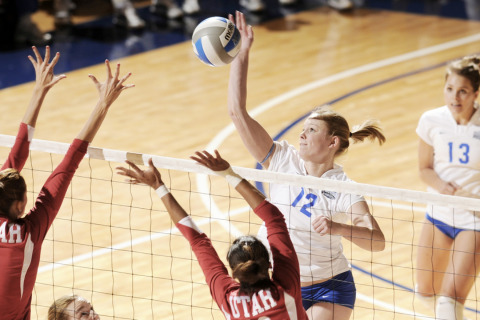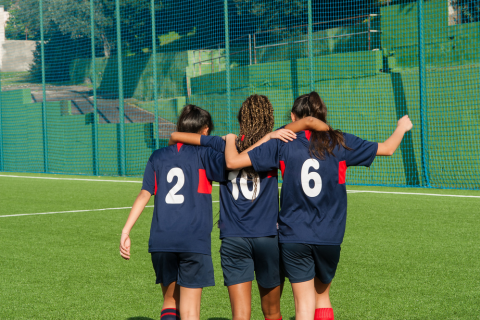 College athletics can provide a platform for student-athletes to challenge themselves at a higher level, both in their sport and in their lives overall. There are many beneficial opportunities that come with playing sports in college, including being part of a team environment of like-minded people, potential scholarships, access to support resources, physical fitness, fun, and the opportunity to elevate your game. However, there are also power dynamics within college athletics: the department financially prioritizes wins over losses. This can contribute to a structure where an athlete’s experiences are not prioritized over and above the department’s drive to win. The “College Athletes Bill of Rights“ aims to address just that, advocating for the protection of student-athletes by prioritizing their needs. I am a counseling psychology PhD student with experience and a passion for working with student-athletes at the collegiate level. I have seen how different compliance regulations and protections influence the struggles and joys of the student-athlete experience. There are always different perspectives and opinions, but I’m hoping to highlight what I see as the main tenets of this proposed legislation.
College athletics can provide a platform for student-athletes to challenge themselves at a higher level, both in their sport and in their lives overall. There are many beneficial opportunities that come with playing sports in college, including being part of a team environment of like-minded people, potential scholarships, access to support resources, physical fitness, fun, and the opportunity to elevate your game. However, there are also power dynamics within college athletics: the department financially prioritizes wins over losses. This can contribute to a structure where an athlete’s experiences are not prioritized over and above the department’s drive to win. The “College Athletes Bill of Rights“ aims to address just that, advocating for the protection of student-athletes by prioritizing their needs. I am a counseling psychology PhD student with experience and a passion for working with student-athletes at the collegiate level. I have seen how different compliance regulations and protections influence the struggles and joys of the student-athlete experience. There are always different perspectives and opinions, but I’m hoping to highlight what I see as the main tenets of this proposed legislation.

You might have seen that in 2021 the Supreme Court ruled in favor of student-athletes by allowing them to earn increased education-related benefits. Prior to this, the NCAA’s compliance rules limited how student-athletes could benefit from their athletic status and still remain eligible to compete under the required ‘amateur status’. The “College Athletes Bill of Rights” continues that conversation with a few key considerations for those playing or planning to play college athletics. A main area of concern is the Name, Image, and Likeness Policy (NIL) which the NCAA says is rapidly evolving. Some are advocating for changes that would allow student-athletes to benefit financially from NIL opportunities. With the rise of social media platforms and influencers creating niche followings, many student-athletes are hoping to share their experiences just like any other college student. They also want to be compensated fairly for their efforts and the notoriety brought to their teams through their athletic skills (think jerseys sold, video games, broadcasting deals).
That brings us to the “College Athletes Bill of Rights”, introduced by Senators Booker, Blumenthal, Schatz, Wyden, and Padilla. Here is a breakdown of the key issues addressed by this piece of legislation and how they might impact your family and your student-athlete.

-
- MEDICAL WELLNESS: Establishing evidence-based health and wellness standards that prioritize student-athletes’ well-being versus a team outcome or institutional gain. We’ve all heard horror stories about times athletes were made to return from an injury like a concussion. One study published in 2015 found that the majority of sports medicine clinicians felt pressure, either from the coaches or athletes themselves, to clear athletes to play after they’d suffered a concussion. The guidelines proposed in the new bill would establish a universal protocol that protects student-athletes’ health by limiting their premature return to competition. This measure would help keep student-athletes healthy both during their time playing in college and after they graduate. Putting the athlete, their longevity, and well-being ahead of the college’s profits or win percentage comes with letting science, not personal priorities, guide decisions.
- MEDICAL EXPENSES: Creating a Medical Trust Fund that athletes can use to cover medical expenses related to treating an injury incurred as a student-athlete. Athletes use their bodies day in and day out, and all of that wear-and-tear and injuries sadly do not disappear when they graduate, even if the access to medical professionals through athletic trainers and sports medicine physicians do. This new fund would allow student-athletes to access financial support for injuries while playing in college and for up to five years after graduation. This would allow institutions to continue caring for their athletes after they leave the playing field.
- ACCOUNTABILITY: Ensuring accountability with transparent reporting of academic outcomes and financial expenditures, salaries, and donations as they relate to athletic department and team functions. This will help student-athletes make informed decisions about the teams they are interested in. It also makes transparent to prospective student-athletes areas where colleges may be falling short of supporting athletes that hold minoritized identities, such as race and gender. Transparent accounting for athletic activities beyond the mandatory team-allotted 20 weekly hours helps protect student-athletes’ time to ensure that they have time to dedicate to academics and wellness.
- ACADEMIC SCHOLARSHIP: Encouraging positive educational outcomes, one of the main reasons for college athletics in the first place. This bill proposes that institutions provide college athletes with financial aid until they graduate, regardless of performance or injury. It further protects athletes’ autonomy to choose a major and participate in extracurricular activities by prohibiting interference from the institution. This is a major aspect of accountability that allows students to pursue academic opportunities that will set them up for success beyond their time playing for a university.
- SOCIAL SUPPORT: Financially supporting athletes facing physical or mental health challenges. Social support is consistently shown to be beneficial for students’ well-being. This could allow for increased positive outcomes for student-athletes who often end up attending institutions far away from their support systems.
- AUTONOMY: Increasing athletes’ sense of agency by allowing them to enter professional sports drafts. This would give them the choice of whether to remain in school after entering.
- BEST FIT: Increasing options to transfer teams without being penalized by needing to sit out a season and lose eligibility. Increased use of the transfer portal in recent years has shaped the way that athletes can choose to transfer and connect with different universities. This can help ensure your athlete has the opportunity to play on a team that prioritizes their own well-being.
While this piece of legislation is a momentous start, The Drake Group identified ways in which it can continue to improve. There should be an intentional focus on the impact of student-athletes with marginalized identities. Given the complexity of the existing NCAA rules and the proposed changes, it can be helpful to talk with your Big Kid about their priorities while playing collegiate sports. That way they can be mindful of their own needs while choosing a university, team, and coach to play for. There will be even more decisions to make with the recent introduction of the transfer portal, as well. It’s important to support your Big Kid as they find their best fit in a team where they can thrive. If you could benefit from support while helping your Big Kid through these issues, Dr. Stephen is a great resource! Feel free to reach out to her!
